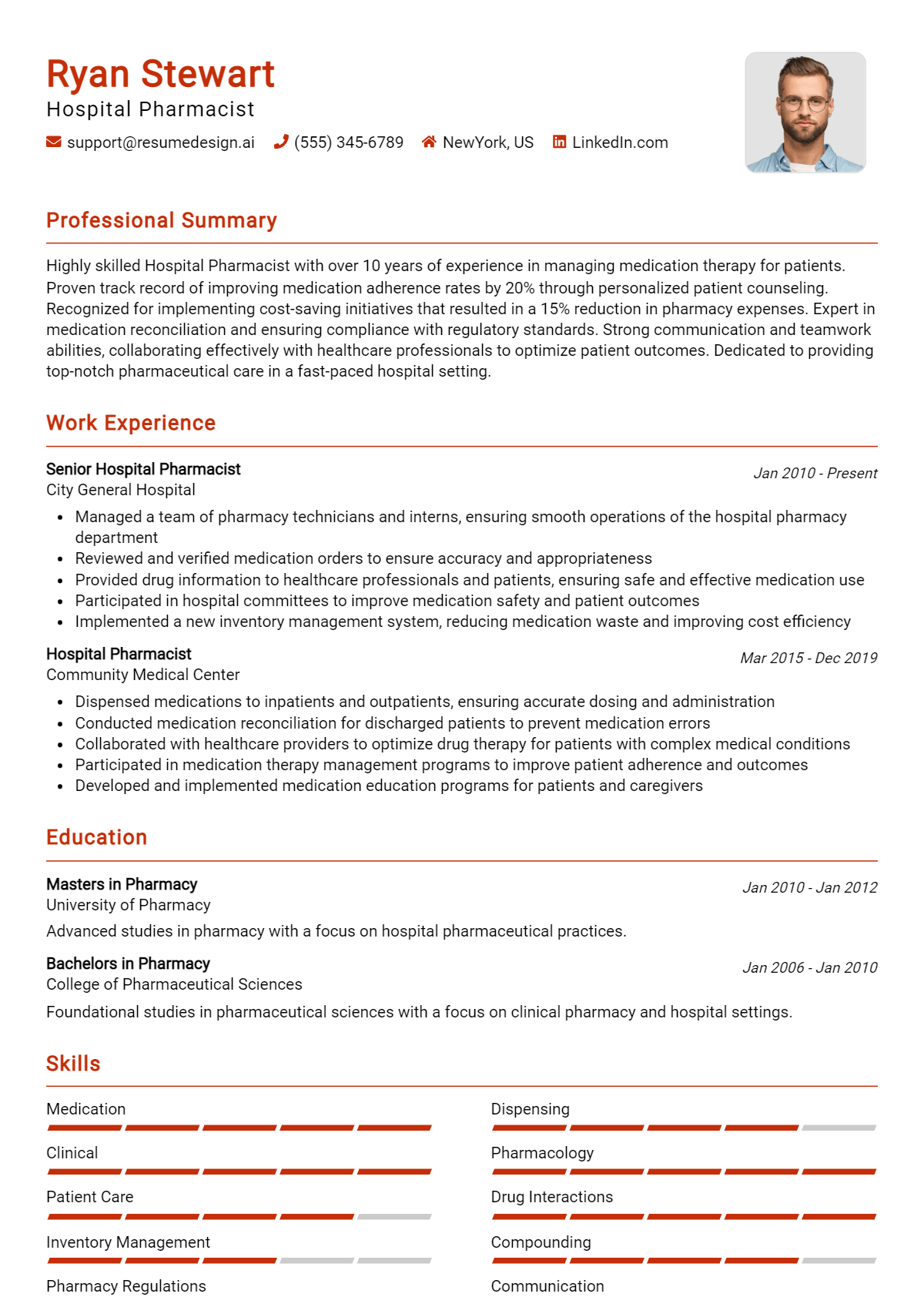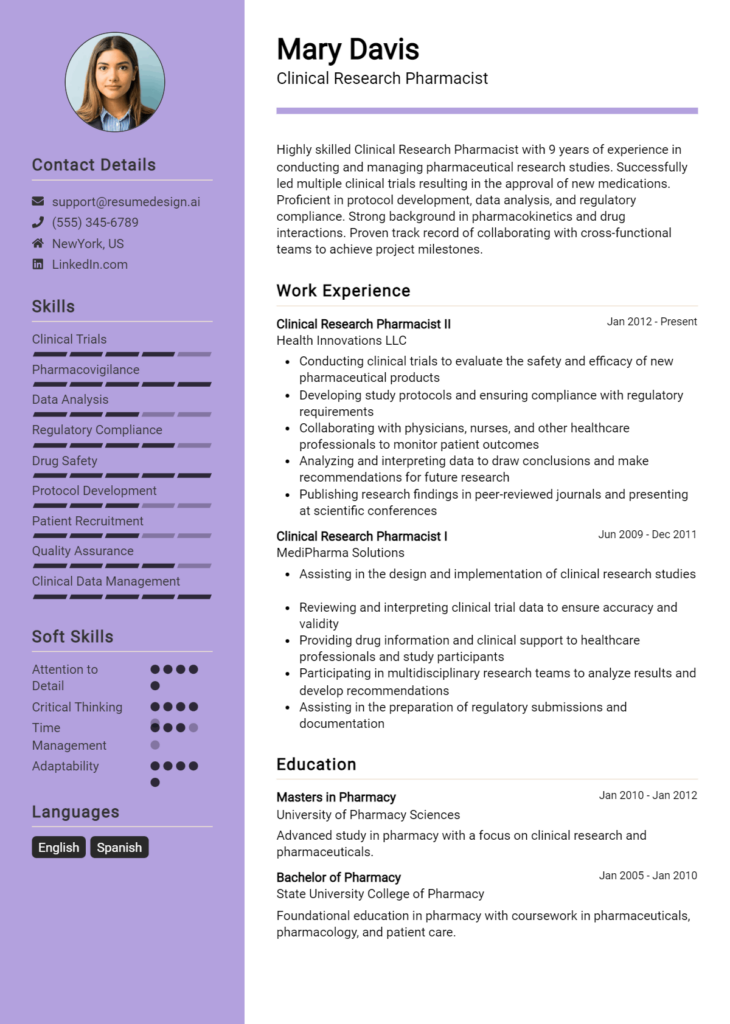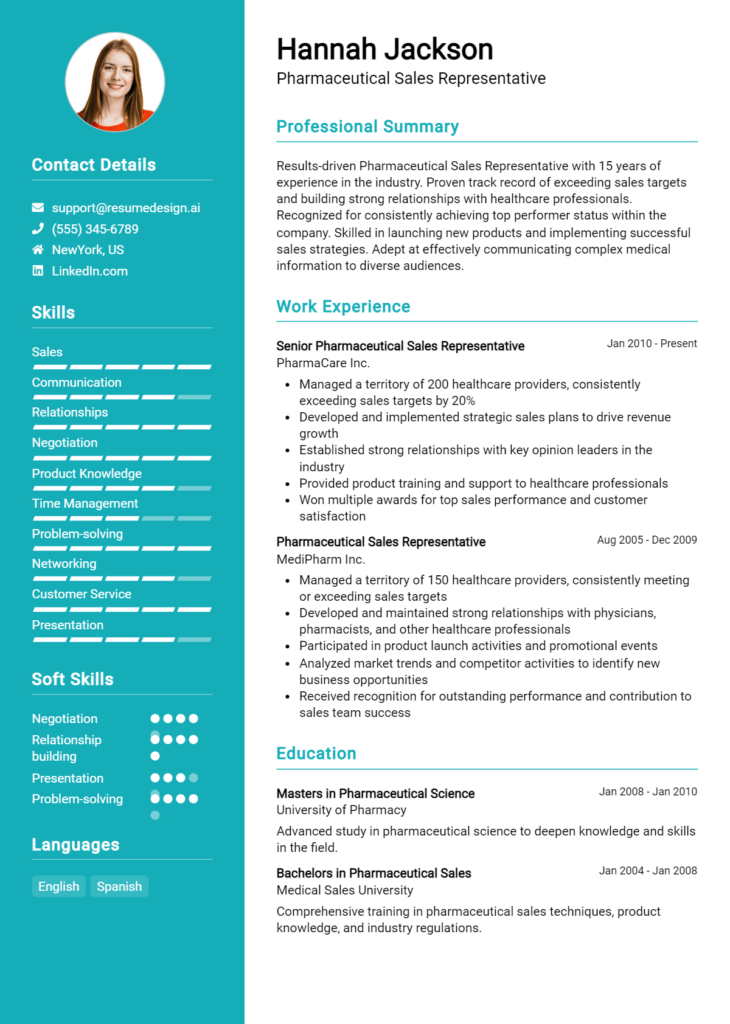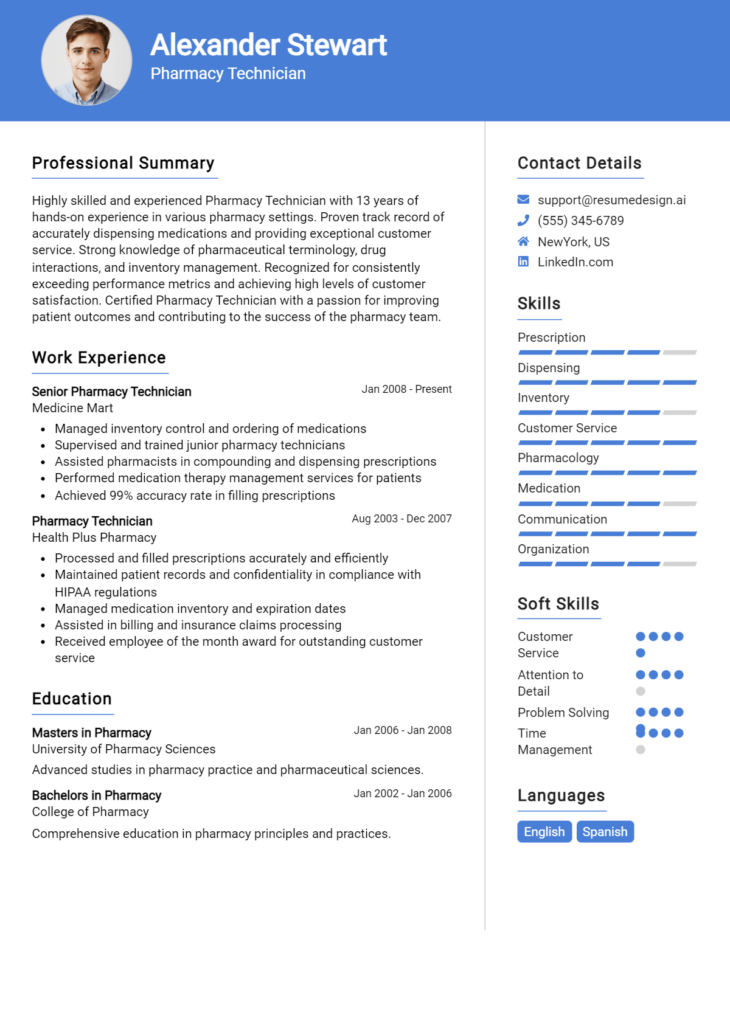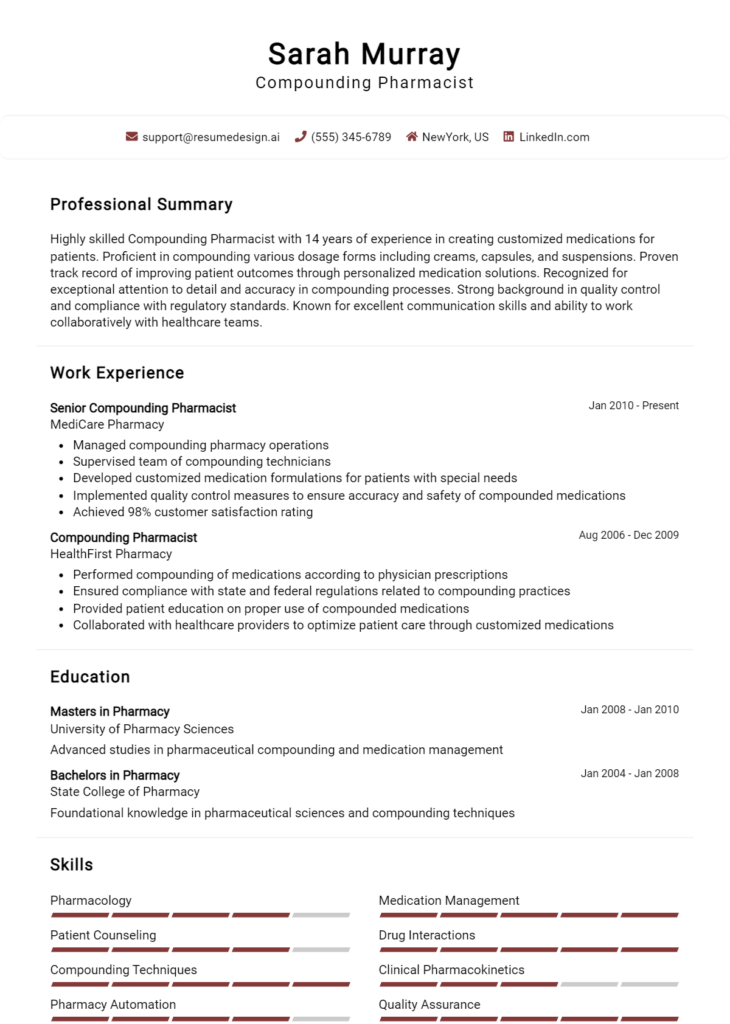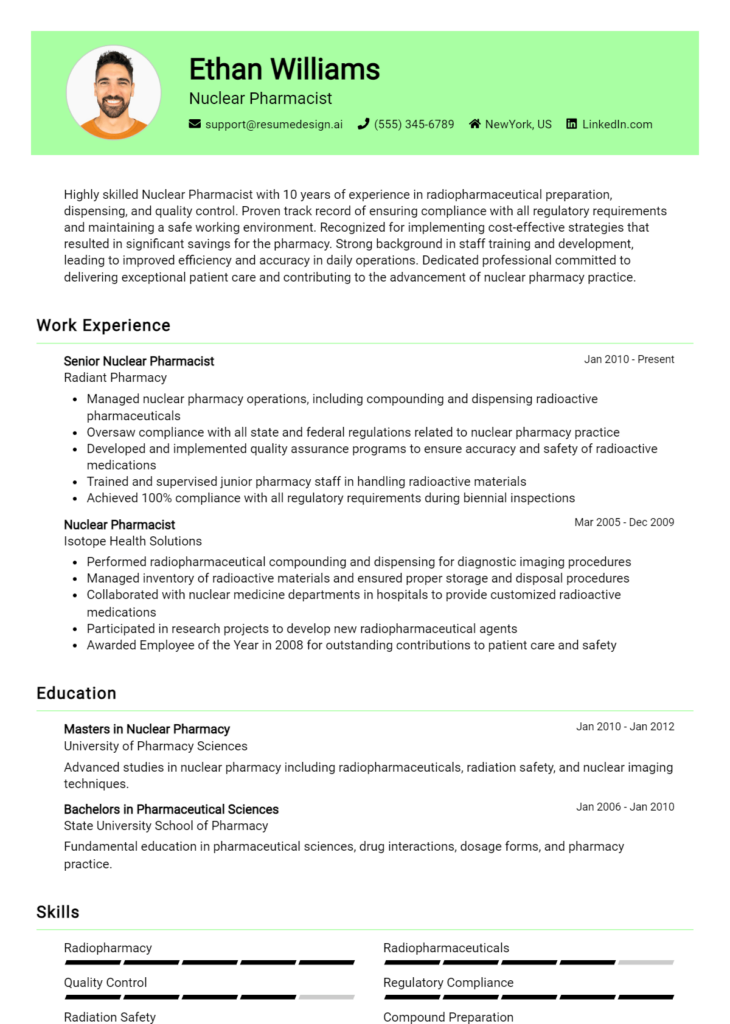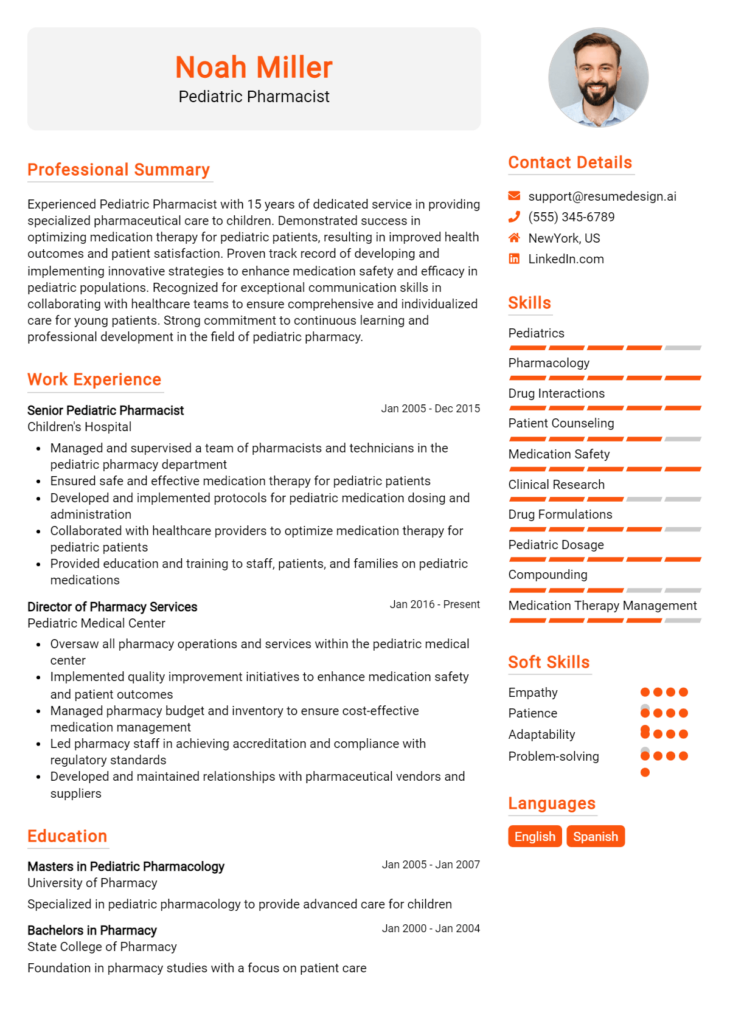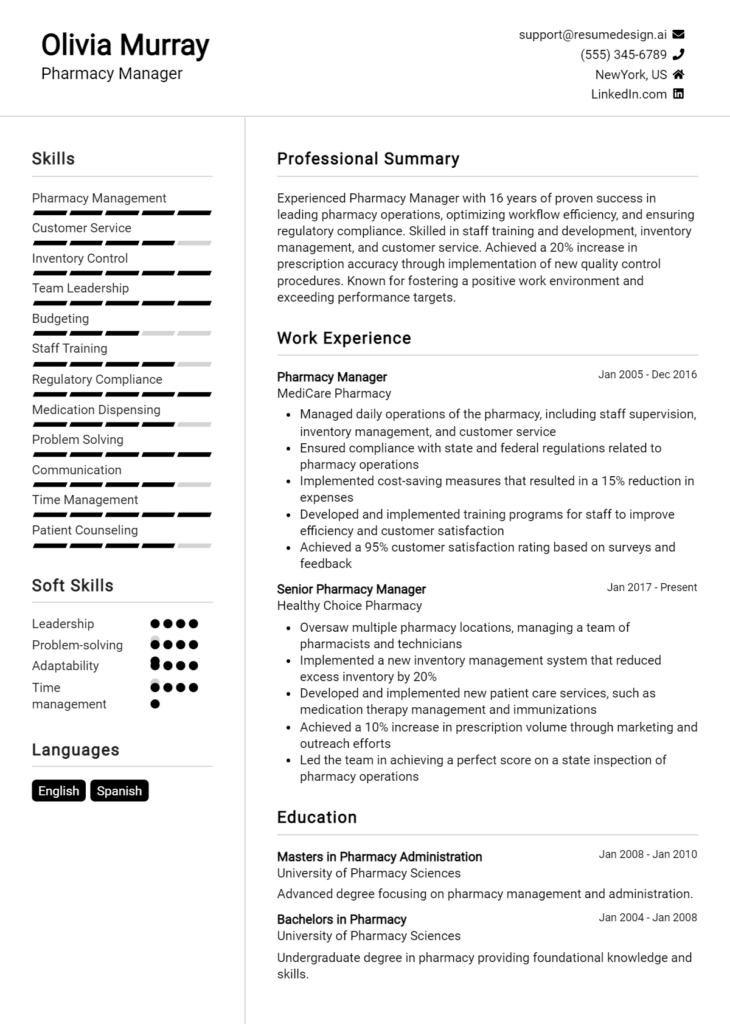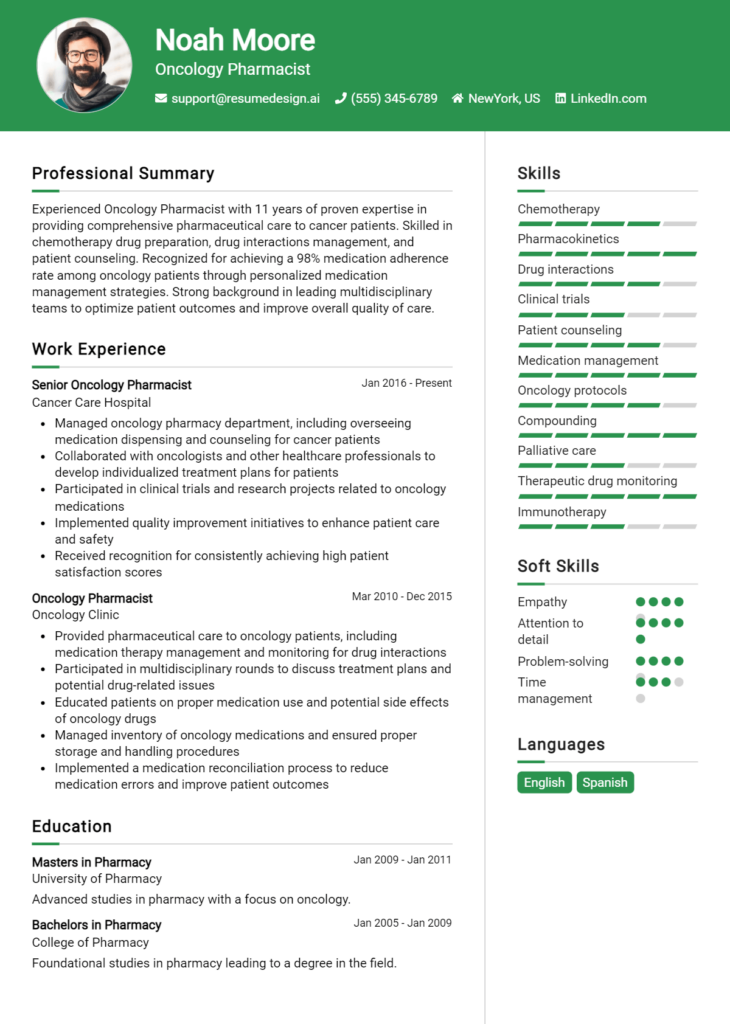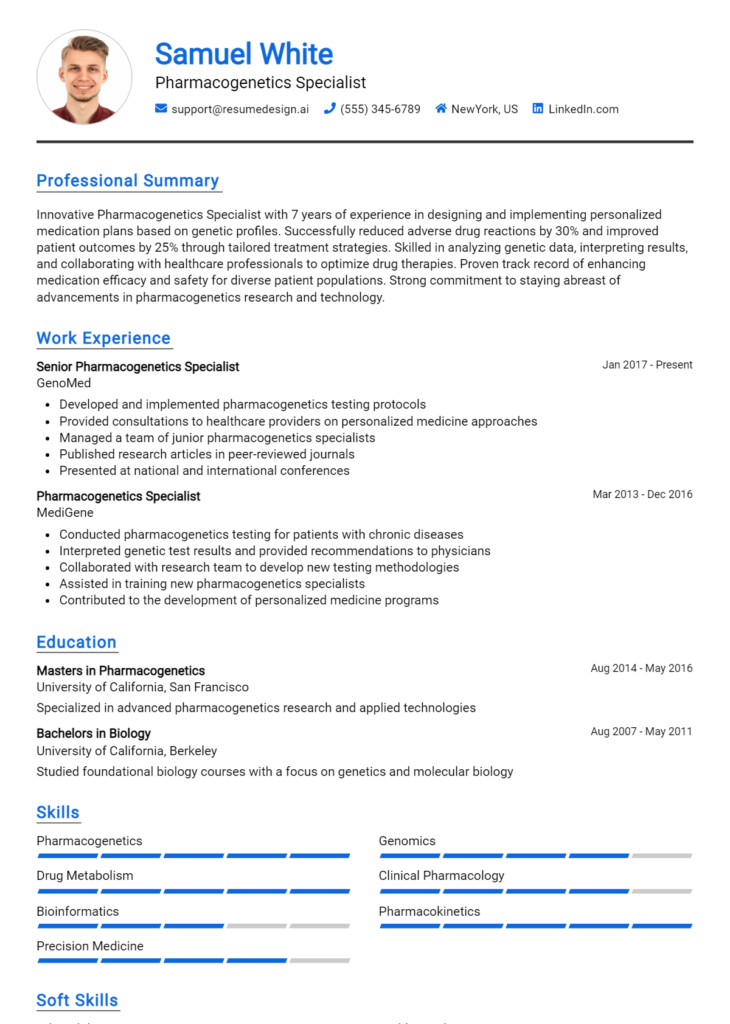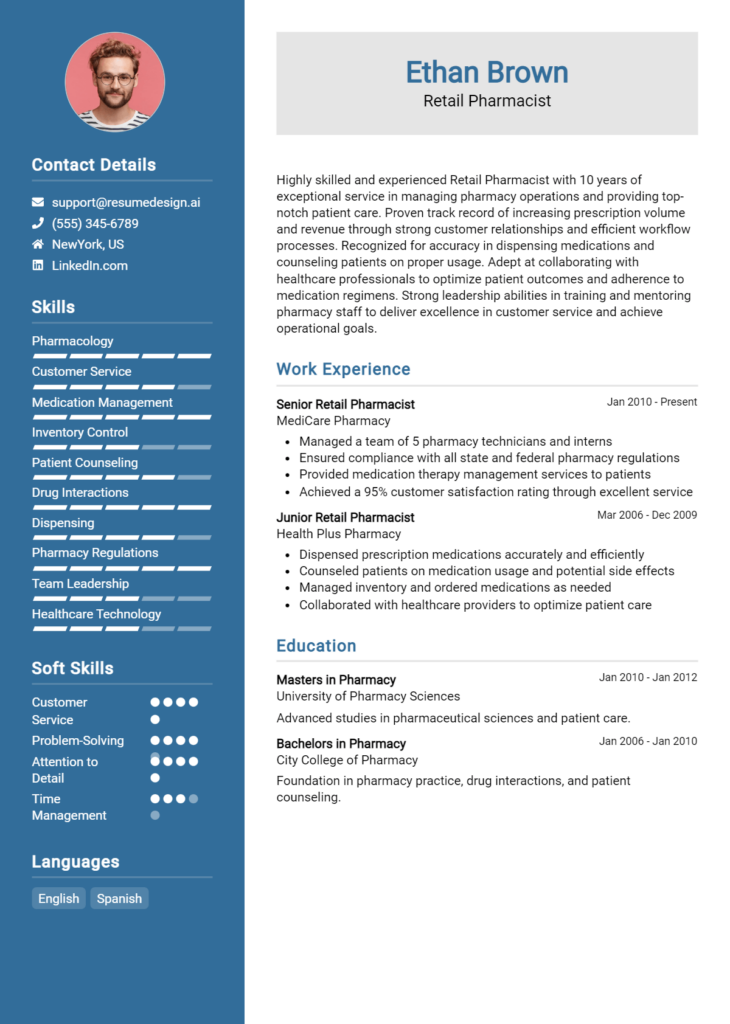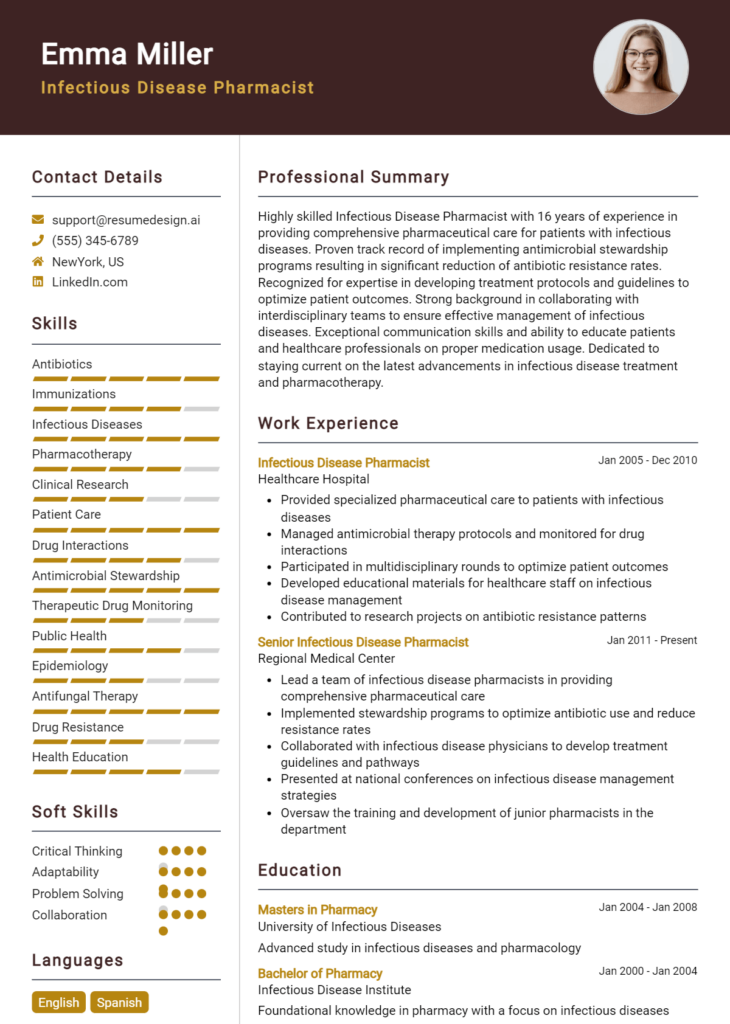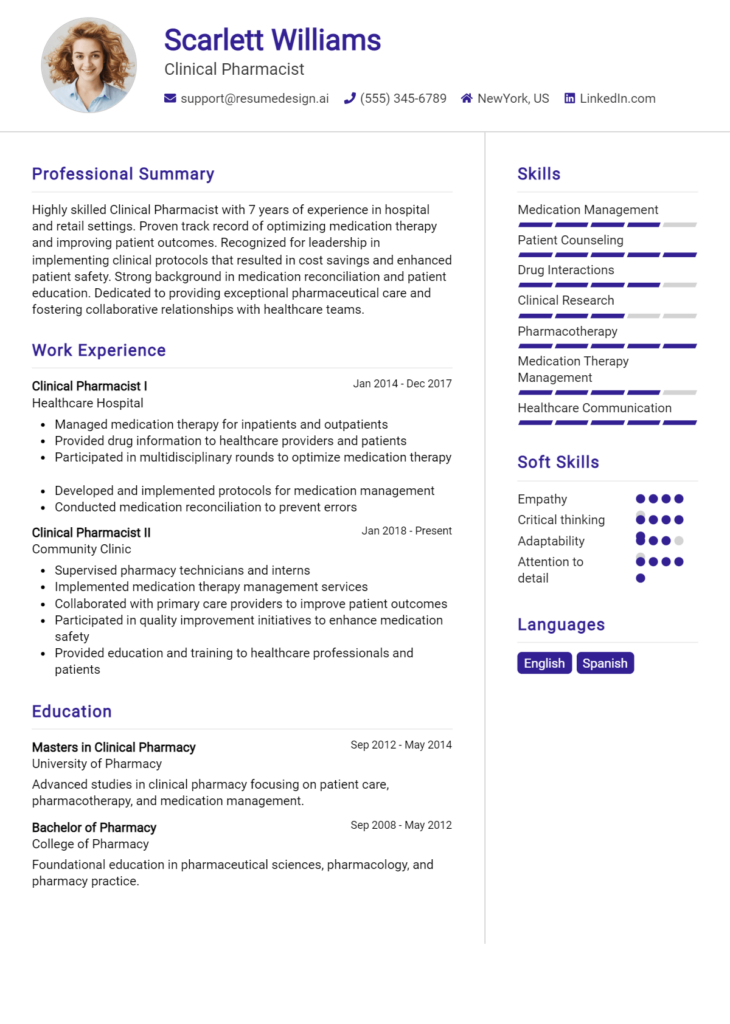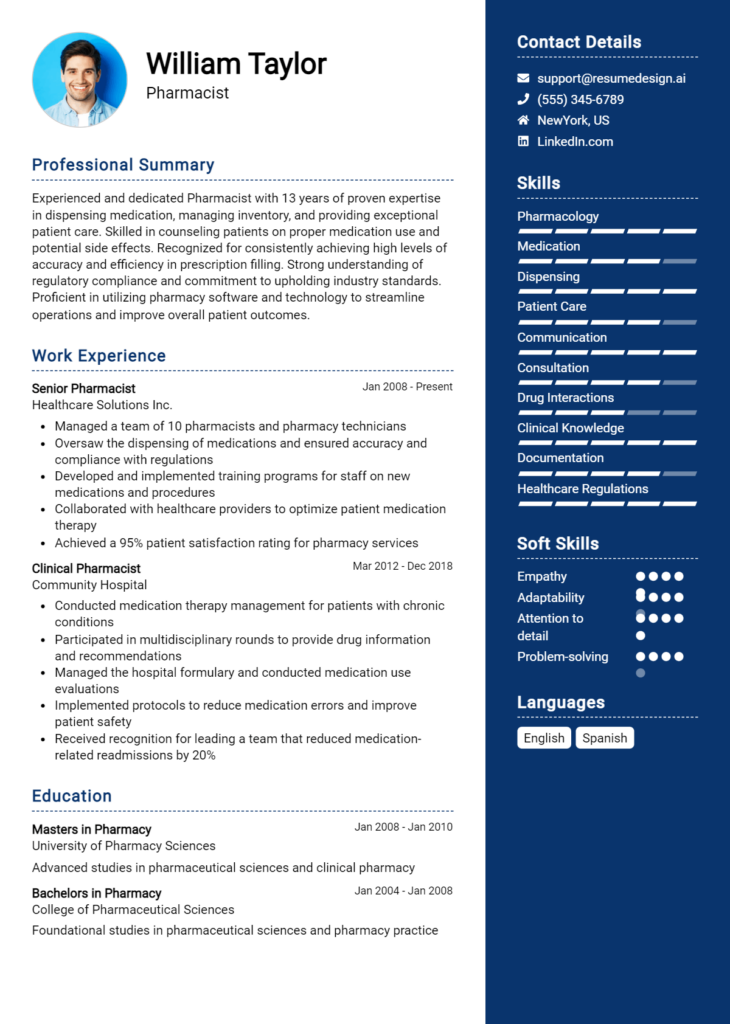Hospital Pharmacist Core Responsibilities
A Hospital Pharmacist plays a crucial role in patient care, serving as a bridge between healthcare providers, patients, and pharmaceutical companies. Key responsibilities include managing medication therapies, ensuring the safe administration of drugs, and collaborating with medical teams to optimize patient outcomes. Success in this role demands strong technical knowledge, operational efficiency, and exceptional problem-solving skills. These competencies are vital for achieving the organization's goals. A well-structured resume can effectively highlight these qualifications, showcasing the pharmacist's ability to enhance patient care and safety.
Common Responsibilities Listed on Hospital Pharmacist Resume
- Review and analyze medication orders for appropriateness and safety.
- Provide drug information and clinical recommendations to healthcare professionals.
- Monitor patient drug therapies and outcomes.
- Participate in interdisciplinary rounds and patient care meetings.
- Educate patients and staff on medication management and safety.
- Prepare and dispense medications, ensuring accuracy and compliance.
- Conduct medication reconciliations during patient admissions and discharges.
- Develop and implement pharmacy protocols and policies.
- Manage inventory and ensure the availability of essential medications.
- Stay updated on pharmaceutical advancements and regulatory changes.
- Participate in quality improvement initiatives and research projects.
- Supervise pharmacy technicians and interns in daily operations.
High-Level Resume Tips for Hospital Pharmacist Professionals
In the competitive field of hospital pharmacy, a well-crafted resume is crucial for making a strong first impression on potential employers. Your resume serves as your professional introduction, showcasing not only your qualifications but also your unique skills and achievements in the pharmaceutical realm. A compelling resume can set you apart from other candidates, demonstrating your dedication to patient care and collaboration within a healthcare team. This guide offers practical and actionable resume tips specifically tailored for Hospital Pharmacist professionals, ensuring you highlight the most relevant aspects of your career.
Top Resume Tips for Hospital Pharmacist Professionals
- Tailor your resume to the specific job description by incorporating keywords from the posting.
- Highlight your relevant experience in hospital settings, focusing on roles that involved direct patient care and collaboration with healthcare teams.
- Quantify your achievements with specific metrics, such as the number of patients managed or improvements in medication adherence rates.
- Showcase your knowledge of medication management systems and electronic health record (EHR) software relevant to the role.
- Include any certifications, such as Board Certification in Pharmacotherapy (BCPS) or other specialized credentials, to enhance your credibility.
- Demonstrate your ability to conduct drug utilization reviews and provide evidence-based recommendations to healthcare providers.
- Highlight your contributions to patient education programs and your effectiveness in communicating complex information to diverse audiences.
- Emphasize your skills in interdisciplinary teamwork, showcasing examples of successful collaborations with physicians, nurses, and other healthcare professionals.
- Keep the format clean and professional, ensuring that your resume is easy to read and visually appealing.
- Proofread for grammatical errors and typos, as attention to detail is crucial in pharmacy practice.
By implementing these tips, Hospital Pharmacist professionals can significantly increase their chances of landing a job in this rewarding field. A resume that effectively demonstrates relevant experience, quantifies achievements, and highlights essential skills will resonate with hiring managers and set the stage for a successful career in hospital pharmacy.
Why Resume Headlines & Titles are Important for Hospital Pharmacist
In the competitive field of hospital pharmacy, having a well-crafted resume headline or title is crucial for standing out among numerous applicants. A strong headline serves as a powerful first impression that can instantly capture the attention of hiring managers, summarizing a candidate's key qualifications in one impactful phrase. It should be concise, relevant, and directly related to the specific position being applied for, effectively highlighting the candidate’s strengths, skills, and experience in a way that aligns with the needs of the employer.
Best Practices for Crafting Resume Headlines for Hospital Pharmacist
- Keep it concise: Aim for a headline that is brief, ideally one line, to ensure clarity.
- Be role-specific: Tailor the headline to reflect the specific position of hospital pharmacist.
- Highlight key skills: Incorporate essential skills or certifications relevant to the role.
- Use impactful language: Choose strong action words that convey confidence and expertise.
- Avoid jargon: Use clear and straightforward language that can be easily understood.
- Focus on achievements: If possible, include quantifiable achievements that demonstrate your capabilities.
- Reflect your experience level: Indicate whether you are an entry-level, mid-level, or senior pharmacist.
- Align with job descriptions: Incorporate keywords from the job listing to increase relevance.
Example Resume Headlines for Hospital Pharmacist
Strong Resume Headlines
Experienced Hospital Pharmacist Specializing in Oncology and Patient-Centered Care
Dedicated Clinical Pharmacist with 5+ Years of Experience in Acute Care Settings
Pharmaceutical Specialist with Proven Track Record in Medication Management and Safety
Certified Hospital Pharmacist Committed to Enhancing Patient Outcomes Through Evidence-Based Practices
Weak Resume Headlines
Pharmacist Looking for Work
Experienced Pharmacist
Hospital Pharmacist Seeking Opportunities
Strong headlines are effective because they are specific, succinct, and tailored to the job, immediately conveying essential information about the candidate’s qualifications and expertise. In contrast, weak headlines lack detail and relevance, failing to make an impact or differentiate the candidate from others. Generic titles do not provide insight into the candidate's unique strengths or contributions, which can lead to missed opportunities in a competitive job market.
Writing an Exceptional Hospital Pharmacist Resume Summary
A well-crafted resume summary is crucial for a Hospital Pharmacist as it serves as the first impression a hiring manager receives. This brief yet impactful introduction is designed to quickly capture attention by highlighting key skills, relevant experience, and significant accomplishments that align with the job role. A strong summary not only showcases a candidate's qualifications but also sets the tone for the entire resume, making it essential to keep it concise, engaging, and tailored to the specific position being applied for.
Best Practices for Writing a Hospital Pharmacist Resume Summary
- Quantify achievements by including specific metrics or results from previous roles.
- Focus on relevant skills such as medication management, patient counseling, and clinical knowledge.
- Tailor the summary to directly reflect the job description and required qualifications.
- Use strong action verbs to convey a sense of proactivity and impact.
- Keep it concise, ideally between 2-4 sentences, to maintain the reader’s attention.
- Highlight any specialized certifications or training that enhance your candidacy.
- Incorporate keywords from the job posting to ensure alignment with employer expectations.
- Showcase a blend of clinical expertise and interpersonal skills to demonstrate a well-rounded profile.
Example Hospital Pharmacist Resume Summaries
Strong Resume Summaries
Detail-oriented Hospital Pharmacist with over 5 years of experience in optimizing medication therapies, achieving a 30% reduction in adverse drug events in a busy urban hospital. Proficient in patient counseling and interdisciplinary collaboration to enhance patient outcomes.
Dedicated Hospital Pharmacist with a proven track record of improving medication adherence among patients by 25% through targeted counseling and education initiatives. Skilled in formulary management and cost-effective medication therapy optimization.
Experienced Hospital Pharmacist specializing in critical care, with 7+ years in a fast-paced hospital environment. Led a team project that implemented a new electronic prescribing system, reducing prescription errors by 40% and improving workflow efficiency.
Weak Resume Summaries
I am a Hospital Pharmacist with experience in a variety of settings. I have worked with many patients and know a lot about medications.
Pharmacist looking for a new opportunity in a hospital. I have skills in managing medicines and helping patients.
The strong resume summaries stand out because they are specific, quantifiable, and directly relevant to the role of a Hospital Pharmacist. They effectively demonstrate the candidate's impact through measurable results and highlight key skills that align with the position. In contrast, the weak summaries lack detail, fail to convey significant accomplishments, and come across as generic, which may leave hiring managers uninterested or unable to discern the candidate’s qualifications.
Work Experience Section for Hospital Pharmacist Resume
The work experience section of a Hospital Pharmacist resume is vital as it serves as a testament to the candidate's practical expertise and contributions within the healthcare setting. This section highlights the candidate's technical skills in medication management, their capability to lead and collaborate with multidisciplinary teams, and their commitment to delivering high-quality pharmaceutical care. By quantifying achievements and clearly aligning experiences with industry standards, candidates can effectively demonstrate their value and readiness for the role, making this section critical in capturing the attention of hiring managers.
Best Practices for Hospital Pharmacist Work Experience
- Detail specific technical skills relevant to hospital pharmacy practices, such as medication therapy management and pharmacokinetics.
- Quantify achievements with metrics, such as the percentage of error reduction in medication dispensing or the number of patients served.
- Highlight leadership roles in managing pharmacy staff or coordinating with healthcare teams to streamline operations.
- Include examples of successful interventions that led to improved patient outcomes or cost savings for the hospital.
- Showcase participation in continuing education or professional development that enhances technical expertise.
- Emphasize collaboration with physicians, nurses, and other healthcare professionals to ensure optimal patient care.
- Use action verbs to convey initiative and impact, such as "implemented," "led," or "developed."
- Tailor the experience to align with the specific requirements and expectations of the job posting.
Example Work Experiences for Hospital Pharmacist
Strong Experiences
- Implemented a new medication reconciliation process that reduced discrepancies by 30%, resulting in improved patient safety during transitions of care.
- Led a team of pharmacists in a quality improvement initiative that decreased medication error rates by 25% over a six-month period.
- Collaborated with a multidisciplinary team to develop a protocol for antibiotic stewardship, achieving a 15% reduction in inappropriate prescribing within the first year.
- Managed a pharmacy budget of $1.5 million, identifying cost-saving opportunities that resulted in a 10% reduction in expenditures without compromising patient care.
Weak Experiences
- Worked in the pharmacy department.
- Helped with medication dispensing.
- Participated in team meetings.
- Assisted in various pharmacy operations.
The examples of strong experiences are considered effective because they provide specific, measurable outcomes and demonstrate leadership, technical expertise, and collaboration—all essential traits for a Hospital Pharmacist. In contrast, the weak experiences lack detail and quantifiable achievements, making them less impactful and failing to showcase the candidate's true capabilities and contributions to patient care.
Education and Certifications Section for Hospital Pharmacist Resume
The education and certifications section of a Hospital Pharmacist resume is crucial in establishing the candidate's academic qualifications and professional credentials. This section not only showcases the pharmacist's formal education but also highlights relevant industry certifications and ongoing educational pursuits. By including pertinent coursework, specialized training, and recognized certifications, candidates can significantly enhance their credibility and demonstrate their commitment to continuous learning and professional development. This alignment with the job role is essential in a competitive field, as it reassures employers of the candidate's expertise and readiness to handle the complexities of hospital pharmacy practice.
Best Practices for Hospital Pharmacist Education and Certifications
- Prioritize relevant degrees, such as Doctor of Pharmacy (Pharm.D.), which is essential for hospital pharmacists.
- Include industry-recognized certifications, such as Board Certified Pharmacotherapy Specialist (BCPS) or Board Certified Oncology Pharmacist (BCOP).
- Detail any specialized training or fellowships relevant to hospital pharmacy practice.
- Highlight any coursework that directly relates to clinical pharmacy, pharmacotherapy, or patient care.
- Keep the section concise but informative, ensuring that it is easy to read and understand.
- Update the section regularly to reflect any new certifications or educational achievements.
- Consider including dates of completion to illustrate the currency of your education and certifications.
- Use a clear and organized format to distinguish between degrees, certifications, and relevant coursework.
Example Education and Certifications for Hospital Pharmacist
Strong Examples
- Doctor of Pharmacy (Pharm.D.), University of XYZ, Graduated May 2020
- Board Certified Pharmacotherapy Specialist (BCPS), Certification obtained June 2021
- Completed Advanced Pharmacy Practice Experience (APPE) in Hospital Pharmacy at ABC Medical Center
- Certificate in Clinical Pharmacy from the American College of Clinical Pharmacy, Completed March 2022
Weak Examples
- Bachelor of Science in Biology, University of ABC, Graduated June 2015
- Certification in Retail Pharmacy Management, Obtained August 2018
- Completed online course in Herbal Medicine, No formal accreditation
- High School Diploma, Graduated May 2010
The examples of education and certifications are considered strong because they directly relate to the competencies required for a hospital pharmacist role, showcasing advanced degrees and recognized credentials that emphasize expertise in clinical settings. In contrast, the weak examples reflect qualifications that are either outdated, irrelevant, or do not align with the specific requirements for hospital pharmacy practice, which could undermine the candidate's credibility in the eyes of potential employers.
Top Skills & Keywords for Hospital Pharmacist Resume
As a Hospital Pharmacist, the significance of showcasing relevant skills on your resume cannot be overstated. Employers prioritize candidates who not only possess the necessary technical knowledge but also exhibit the interpersonal traits essential for effective collaboration in a healthcare environment. Highlighting a balanced mix of hard and soft skills demonstrates your capability to manage complex medications, interact with healthcare professionals, and provide high-quality patient care. A well-crafted resume that emphasizes these skills can set you apart from other applicants and pave the way for a successful career in pharmacy.
Top Hard & Soft Skills for Hospital Pharmacist
Soft Skills
- Strong Communication Skills
- Attention to Detail
- Empathy and Compassion
- Problem-Solving Abilities
- Teamwork and Collaboration
- Time Management
- Adaptability and Flexibility
- Critical Thinking
- Patient Advocacy
- Ethical Judgment
Hard Skills
- Comprehensive Knowledge of Pharmacology
- Proficiency in Medication Management
- Familiarity with Drug Interactions
- Experience with Pharmaceutical Calculations
- Knowledge of Electronic Health Records (EHR) Systems
- Ability to Monitor Patient Outcomes
- Expertise in Compounding Medications
- Understanding of Pharmacy Law and Regulations
- Skills in Inventory Management
- Familiarity with Clinical Guidelines and Protocols
For further enhancement of your resume, consider incorporating skills and showcasing your work experience effectively.
Stand Out with a Winning Hospital Pharmacist Cover Letter
Dear [Hiring Manager's Name],
I am writing to express my interest in the Hospital Pharmacist position at [Hospital Name], as advertised on [where you found the job listing]. With a Doctor of Pharmacy degree from [Your University] and over [X years] of experience in clinical pharmacy settings, I am excited about the opportunity to contribute to your esteemed team. My background in patient care, medication therapy management, and interdisciplinary collaboration aligns perfectly with the responsibilities outlined in your job description.
In my previous role at [Previous Hospital/Pharmacy Name], I successfully managed a diverse patient population, ensuring optimal therapeutic outcomes through comprehensive medication reviews and personalized care plans. I am adept at identifying potential drug interactions and contraindications, which has significantly improved patient safety and satisfaction scores. Additionally, I actively participated in rounds with physicians, providing valuable insights that improved treatment protocols and enhanced collaboration among the healthcare team.
I am particularly drawn to [Hospital Name]'s commitment to patient-centered care and innovative practices in pharmacy services. I believe my skills in patient education, formulary management, and clinical research would add value to your team. Furthermore, I am dedicated to staying current with the latest advancements in pharmacotherapy, and I am eager to contribute to [Hospital Name]'s mission of delivering exceptional healthcare.
Thank you for considering my application. I am looking forward to the opportunity to discuss how my experience and passion for pharmacy can benefit your team. I am excited about the possibility of contributing to [Hospital Name] and am available for an interview at your earliest convenience.
Sincerely,
[Your Name]
[Your Phone Number]
[Your Email Address]
Common Mistakes to Avoid in a Hospital Pharmacist Resume
When crafting a resume for a Hospital Pharmacist position, it's crucial to highlight relevant skills and experiences while avoiding common pitfalls that could undermine your application. A well-structured resume can set you apart in a competitive job market, but certain mistakes can detract from your qualifications and diminish your chances of landing an interview. Here are some common mistakes to avoid:
Generic Objective Statements: Using a vague objective that doesn’t reflect your specific goals or the needs of the hospital can make your resume blend in. Tailor your objective to align with the job you're applying for.
Overloading with Irrelevant Experience: Including unrelated work history can clutter your resume. Focus on experiences that directly relate to the role of a hospital pharmacist and demonstrate your skills in clinical settings.
Neglecting Keywords: Failing to incorporate relevant keywords from the job description can result in your resume being overlooked by automated applicant tracking systems. Carefully read the job posting and use specific terms related to pharmacy practice.
Poor Formatting: A cluttered or overly complex layout can make your resume difficult to read. Use a clean, professional format with clear headings and bullet points to enhance readability.
Lack of Quantifiable Achievements: Instead of simply listing duties, emphasize your accomplishments with quantifiable results, such as medication error reduction rates or successful implementation of pharmacy programs.
Omitting Licenses and Certifications: Not prominently displaying your pharmacy licenses and certifications can be a significant oversight. Ensure these are easily visible and up to date, as they are critical to your qualifications.
Ignoring Continuing Education: Failing to mention ongoing education or professional development can suggest a lack of commitment to the field. Highlight any additional training or courses that demonstrate your dedication to staying current in pharmacy practices.
Spelling and Grammar Errors: Typos and grammatical mistakes can create a negative impression of your attention to detail, which is essential in a pharmacy role. Always proofread your resume or have someone else review it before submission.
Conclusion
As a Hospital Pharmacist, you play a crucial role in patient care, ensuring that medications are used safely and effectively. Your responsibilities include reviewing medication orders, providing drug information to healthcare professionals, counseling patients on medication use, and monitoring patient outcomes. Additionally, you work collaboratively with doctors and nurses to optimize pharmacotherapy and participate in the development of treatment protocols.
Given the complexities of this role, having a well-crafted resume is essential to showcase your skills, experience, and achievements. A strong resume not only highlights your clinical expertise but also demonstrates your ability to contribute to patient care and safety in a hospital setting.
To enhance your job application, consider reviewing your Hospital Pharmacist resume to ensure it aligns with current industry standards and effectively captures your qualifications. Utilize resources available to you, such as resume templates, which can provide a professional layout, and the resume builder that guides you in crafting a tailored resume. You can also explore resume examples to inspire your content and ensure your achievements stand out. Don’t forget to pair your resume with a strong introduction; our cover letter templates can help you create a compelling cover letter that complements your resume.
Take action today by reviewing and updating your resume to reflect your expertise as a Hospital Pharmacist. The right resume can make a significant difference in your job search, so make sure you're putting your best foot forward!

